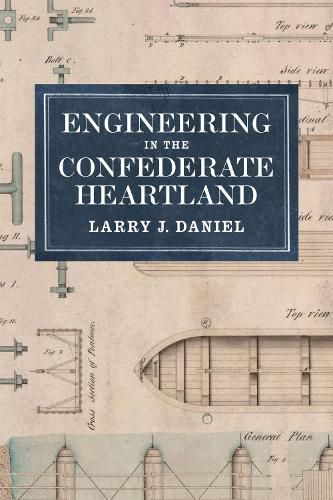Readings Newsletter
Become a Readings Member to make your shopping experience even easier.
Sign in or sign up for free!
You’re not far away from qualifying for FREE standard shipping within Australia
You’ve qualified for FREE standard shipping within Australia
The cart is loading…






While engineers played a critical role in the performance of both the Union and Confederate armies during the Civil War, few historians have examined their experiences or impact. Larry J. Daniel’s Engineering in the Confederate Heartland fills a gap in that historiography by analyzing the accomplishments of these individuals working for the Confederacy in the vast region between the Appalachian Mountains and the Mississippi River, commonly referred to as the Western Theater. Though few in number, the members of the western engineer corps were vital in implementing Confederate strategy and tactics.
Most Confederate engineers possessed little to no military training, transitioning from the civilian tasks of water drainage, railroad construction, and land surveys to overseeing highly technical war-related projects. Their goal was simple in mission but complex in implementation: utilize their specialized skills to defeat, or at least slow, the Union juggernaut. The geographical diversity of the Heartland further complicated their charge. The expansive area featured elevations reaching over six thousand feet, sandstone bluffs cut by running valleys on the Cumberland Plateau, the Nashville basin’s thick cedar glades and rolling farmland, and the wind-blown silt soil of the Loess Plains of the Mississippi Valley. Regardless of the topography, engineers encountered persistent flooding in all sectors.
Daniel’s study challenges the long-held thesis that the area lacked adept professionals. Engineers’ expertise and labor, especially in the construction of small bridges and the laying of pontoons, often proved pivotal. Lacking sophisticated equipment and technical instruments, they nonetheless achieved numerous successes: the Union army never breached the defenses at Vicksburg or Atlanta, and by late 1864, the Army of Tennessee boasted a pontoon train sufficient to span the Tennessee River. Daniel uncovers these and other essential contributions to the war effort made by the Confederacy’s western engineers.
$9.00 standard shipping within Australia
FREE standard shipping within Australia for orders over $100.00
Express & International shipping calculated at checkout
While engineers played a critical role in the performance of both the Union and Confederate armies during the Civil War, few historians have examined their experiences or impact. Larry J. Daniel’s Engineering in the Confederate Heartland fills a gap in that historiography by analyzing the accomplishments of these individuals working for the Confederacy in the vast region between the Appalachian Mountains and the Mississippi River, commonly referred to as the Western Theater. Though few in number, the members of the western engineer corps were vital in implementing Confederate strategy and tactics.
Most Confederate engineers possessed little to no military training, transitioning from the civilian tasks of water drainage, railroad construction, and land surveys to overseeing highly technical war-related projects. Their goal was simple in mission but complex in implementation: utilize their specialized skills to defeat, or at least slow, the Union juggernaut. The geographical diversity of the Heartland further complicated their charge. The expansive area featured elevations reaching over six thousand feet, sandstone bluffs cut by running valleys on the Cumberland Plateau, the Nashville basin’s thick cedar glades and rolling farmland, and the wind-blown silt soil of the Loess Plains of the Mississippi Valley. Regardless of the topography, engineers encountered persistent flooding in all sectors.
Daniel’s study challenges the long-held thesis that the area lacked adept professionals. Engineers’ expertise and labor, especially in the construction of small bridges and the laying of pontoons, often proved pivotal. Lacking sophisticated equipment and technical instruments, they nonetheless achieved numerous successes: the Union army never breached the defenses at Vicksburg or Atlanta, and by late 1864, the Army of Tennessee boasted a pontoon train sufficient to span the Tennessee River. Daniel uncovers these and other essential contributions to the war effort made by the Confederacy’s western engineers.